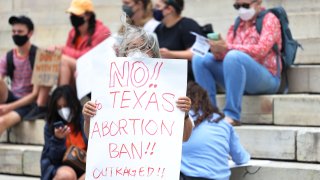
- The Department of Justice is suing Texas over the state's restrictive abortion law.
- The lawsuit comes after the Supreme Court, stacked 6-3 with conservative justices, last week refused to block the controversial abortion law from taking effect.
- President Joe Biden had blasted the high court's overnight ruling, saying it "insults the rule of law."
The Department of Justice on Thursday sued Texas over its restrictive new abortion law, saying the state's legislature enacted the statute "in open defiance of the Constitution."
The lawsuit comes after the Supreme Court, stacked 6-3 with conservative justices, last week refused to block the controversial abortion law, which bans almost all abortions after as early as six weeks of pregnancy, from taking effect.
Feeling out of the loop? We'll catch you up on the Chicago news you need to know. Sign up for the weekly Chicago Catch-Up newsletter here.
President Joe Biden had blasted the high court's overnight ruling, saying it "insults the rule of law." Attorney General Merrick Garland said at the time that the Justice Department was "evaluating all options to protect the constitutional rights of women, including access to an abortion."
Garland announced the civil lawsuit against Texas during a 3 p.m. ET press conference.
"The act is clearly unconstitutional," Garland said.
Money Report
The 30-page complaint against the Lone Star State, filed in federal court in Austin, also accuses Texas of adopting "an unprecedented scheme" to insulate the abortion law from legal challenges by empowering private citizens to "serve as bounty hunters" against those who seeks out or assists in obtaining abortions.
The government is asking the court to declare the abortion law "invalid, null, and void," and bar Texas from enforcing it in any way.
"This kind of scheme to nullify the Constitution of the United States is one that all Americans, whatever their politics or party, should fear," Garland said Thursday. "If it prevails, it may become a model for action in other areas, by other states and with respect to other constitutional rights and judicial precedents."
"Nor need one think long or hard to realize the damage that would be done to our society if states were allowed to implement laws that empower any private individual to infringe on another's constitutionally protected rights in this way," the U.S. attorney general said.
The law, which was signed into law in May by Republican Gov. Greg Abbott, prohibits abortion after the detection of a fetal heartbeat, which usually occurs around the sixth week of pregnancy. At that time, many women are still not aware that they have become pregnant.
The legislation, S.B. 8, includes an exception for medical emergencies, but not for pregnancies resulting from rape or incest. Abbott this week defended the law, and said his goal is to "eliminate rape so that no woman, no person, will be a victim of rape."

Rather than put public officials or law enforcement in charge of enforcing the ban, the law empowers private citizens to file civil lawsuits against abortion providers or anyone who "aids or abets" in an abortion after the six-week threshold. Those lawsuits can yield at least $10,000 in "statutory damages" per abortion.
Critics say those rules effectively establish a bounty system in order to sidestep the abortion rights enshrined in the landmark 1973 Supreme Court case Roe v. Wade.
But the Supreme Court, in a 5-4 ruling, denied an emergency request from abortion-rights advocates for a temporary injunction to stop the abortion law from taking effect on Sept. 1.
The majority, which included all three justices appointed by former President Donald Trump, wrote in a one-paragraph ruling that the petitioners had "not carried their burden" on complex procedural questions raised in the case.
But they noted that "this order is not based on any conclusion about the constitutionality of Texas's law."
Justice Sonia Sotomayor wrote in dissent that Texas had effectively "deputized the State's citizens as bounty hunters, offering them cash prizes for civilly prosecuting their neighbors' medical procedures."
Planned Parenthood, one of the groups that petitioned the Supreme Court to block S.B. 8, applauded the Biden administration for filing the civil lawsuit.
"Right now patients across Texas are scared, they are confused, and they are being left with nowhere to turn to access safe, legal abortion," Planned Parenthood CEO Alexis McGill Johnson said in a statement.
"We hope this important next step by the Biden administration will help restore Texans' access to the health care they need," Johnson said.
This is breaking news. Please check back for updates.






